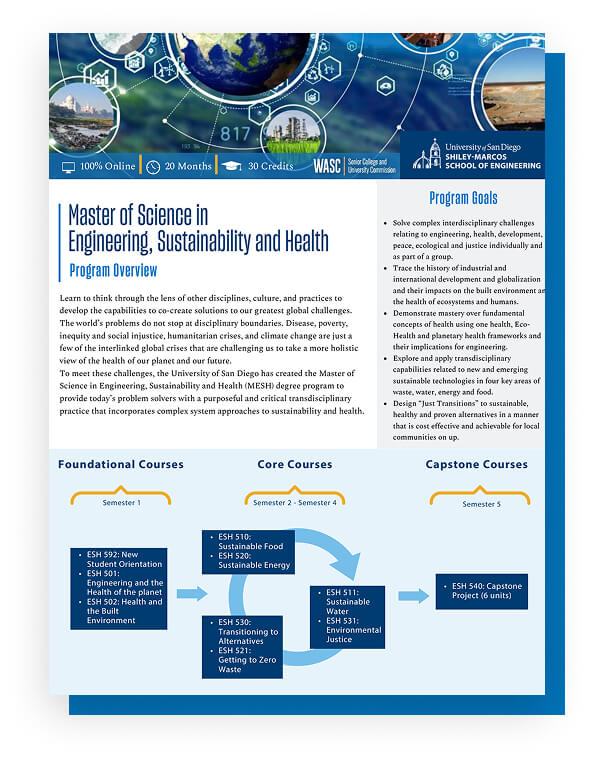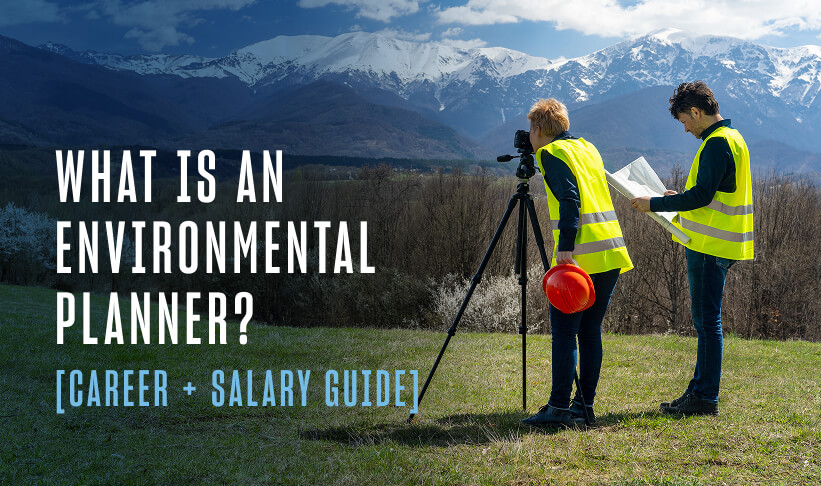If you’re looking for ways to build your skills and credentials within sustainable practices, earning a sustainability certification can be a worthwhile investment. Even if you’re just interested in improving your job prospects, attending a sustainability certification program can signal to employers your dedication to self-improvement and environmental, social and governance (ESG) goals.
Earning a sustainability certification is more than obtaining a piece of paper; it signifies your commitment to making a difference, helps you stand out from other candidates and lends greater trust and credibility to the companies you work for. Here’s what you need to know about the top sustainable certification programs and how they can help your career.
Why earn a sustainable certification?
Within every industry, there are organizations that offer courses and programs that award professional certifications. These certifications act as credentials that verify you have demonstrated a specific level of knowledge, expertise and competence in that particular field or industry. Certifications help show employers, partners, grantmakers, government agencies and other stakeholders that you are a learned and practiced contributor in your field.
As more businesses, even those not focused on sustainability, adopt ESG goals, they’re likely to prefer candidates who have ESG credentials and certifications. And if you work in sustainability, interested in pursuing such a career within a sustainability field, or want to bring sustainability practices to your current job, professional certifications will help you develop the necessary skills and gain the required expertise. This is especially valuable in areas of construction, renewable energy, project management and green technology development, where sustainability certifications can demonstrate your ability to comply with increasingly complex environmental regulations and recognized best practices.
A sustainability certification not only highlights your skills and qualifications within your chosen profession; it can also improve your chances of earning higher-level positions. According to GreenBiz’s State of the Profession 2022 report, when asked about which advanced training certifications they’ve earned:
- 46% of sustainability professionals said they have received training in The Global Reporting Initiative (GRI) framework, and more than 50% of directors and VPs say they have earned GRI training.
- 23% of sustainability professionals within the construction, real estate and retail industries have earned Leadership in Energy and Environmental Design (LEED) Accredited Professionals Green Associate certification, while 20% have earned an LEED AP certification.
- 41% of managers, directors and vice presidents have sought more education, training and certification in ESG and sustainable finance, while 39% sought more education in environmental education regarding climate, carbon, waste and water.
- 70% of professionals working in sustainability have some sort of advanced degree beyond their bachelor’s.
As more industries commit to sustainability practices, environmental sustainability certificate programs become increasingly important as resources to both start and advance your career.
What you gain by completing a sustainability certification
Certificate programs should definitely be part of your larger plan for building your skills and knowledge, especially if you’re going to work in industries such as energy or construction. Aside from the specific recognition of the certification itself, here’s what you stand to gain by attending a program:
- Specialized expertise and knowledge: Because they’re highly focused programs of study, certification programs provide a direct way to stay up-to-date with industry best practices, regulations and essential principles.
- Greater credibility: Earning a certification, or several, demonstrates your knowledge of certain sustainability principles and practices. They highlight your competence in a more targeted way that’s different from how a degree or work experience establishes your general expertise.
- More appeal as a job candidate: Sustainability certifications can help set you apart from other candidates, as they show potential employers that you possess the relevant knowledge and skills they’re looking for. Certain sustainability initiatives may actually require that you possess certain certifications.
- An expanded professional network: Most certification programs will require you to attend a training course or even provide membership to the certifying organization, either of which can help grow your professional network. Even online certificate programs can open up opportunities to network with other professionals and open doors to new opportunities and collaborations.
- Continued personal development: Earning a sustainability certification can be a fulfilling personal achievement, especially if you’re committed to sustainable practices or realizing ESG goals. Certifications allow you a deeper understanding of global environmental challenges and can inspire you about the ways individuals and organizations can contribute to positive change.
Which careers require sustainability certification?
Understand that there’s no one-size-fits-all certification for sustainability professionals, and not all careers explicitly require a sustainability certification. However, the demand for sustainability certifications does continue to grow across various industries as sustainable practices are seen as increasingly important — if not required — for their operations and decision-making.
In general, the industries where a sustainability certification is especially important are:
- Green Building and Construction: Careers related to sustainable building and construction often require specialized certifications such as Leadership in Energy and Environmental Design Accredited Professionals (LEED).
- Supply Chain and Procurement: Professionals working to optimize supply chain sustainability, ethical sourcing and responsible procurement practices may pursue certifications including the Certified Sustainable Supply Chain Professional.
- Renewable Energy Specialist: Individuals involved in renewable energy project development, installation and management may seek to earn certifications such as the Renewable Energy Professional Certification (REP).
- Finance and Investment: Financial professionals that want to make sound financial decisions around sustainable development goals should consider programs such as the Certificate in Green and Sustainable Finance.
- Corporate Social Responsibility (CSR) Manager: CSR managers are responsible for developing and overseeing sustainability and social responsibility programs, so they may benefit from certifications such as Global Reporting Initiative (GRI) Sustainability Reporting.
- Urban Planning and Development: Professionals involved in sustainable urban planning and development may find helpful certifications that prioritize social sustainability and equity, such as SEAM AP Accreditation.
- Environmental Consultant/Analyst: Environmental consultants and analysts who provide expertise on environmental regulations, impact assessments and sustainability strategies may benefit from certifications such as the Associate Environmental Professional (AEP).
There are hundreds of certifications available across a dozen industries — which are right for your career? Consider the following tips:
- Take measure of your existing skill set, then consider the work you want to be doing and what skills or experience will be required. Do some critical thinking about which certifications would best fill those gaps.
- Research different posted job descriptions for companies or positions that interest you. Do they require or prefer certain subject matter expertise or specific certifications?
- Read more about the organizations that offer certification programs and determine if they’re recognized as a credible source of certification by industry experts. You’ll want to prioritize organizations with a strong track record and reputation.
- Reach out and contact other people that are doing the type of work you want to do. Talk to them about the training they have and the certification they’ve earned. What frameworks, tools or programs do they recommend?
Want to Work with Other Professionals Toward Sustainable Solutions? Learn More About the MESH Program in Our On-Demand Webinar — Watch Now
Sustainability certification programs
It’s not hyperbole to state that there can feel like an overwhelming amount of sustainability certificate programs. That said, we’ve tried to narrow things down a bit and organize them based on some general categories. Here’s an overview of 39 of the most common and highly regarded certification programs and frameworks.
General sustainability certifications
Both the International Society of Sustainability Professionals (ISSP) and the Association of Climate Change Officers (ACCO) offer certifications that demonstrate you have knowledge of important sustainability concepts and can help organizations integrate sustainability practices across multiple functions, industries and regions.
- International Society of Sustainability Professionals (ISSP)
- The Association of Climate Change Officers (ACCO)
The National Registry of Environmental Professionals (NREP) offers certifications that verify your knowledge of environmental regulations and proactive sustainability practices, while EcoActUs provides a certification that highlights your leadership skills in sustainable development across different industries and sectors.
- National Registry of Environmental Professionals
- EcoActUs Leadership Development
The University of San Diego also offers an Engineering, Sustainability and Health Certificate through the Division of Professional and Continuing Education. While the program does not culminate in industry certification or licensure, it opens students’ minds to the transdisciplinary nature of solving challenges that impact global health. The certificate serves as an ideal introduction to USD’s online Engineering, Sustainability and Health master’s degree, where students actually begin to develop their own solutions for creating a more sustainable society.
- University of San Diego Division of Professional and Continuing Education
Sustainability and ESG reporting certifications
As of right now, there’s no unified system for ESG reporting, though the European Union continues to develop its European Sustainability Reporting Standard (ESRS), which will introduce reporting requirements phased in over time for different kinds of companies. The first companies will have to apply the standards in the financial year 2024, for reports published in 2025.
For now, consider the industry that you’d like to work in and ask current practitioners which certification they use to inform their reporting. The most common certifications are:
- Global Reporting Initiative (GRI)
- Sustainability Accounting Standards Board (SASB)
- Association of International Certified Professional Accountants (AICPA)
Neither the CDP nor the Task Force on Climate-related Financial Disclosures (TCFD) have formal certification programs, but they do offer valuable training resources.
- Task Force on Climate-related Financial Disclosures (TCFD)
- CDP
Green building certifications
If you’re looking to work in building design, construction or retrofitting — or work as a sustainability consultant, designer or architect — then you should consider pursuing green building certifications.
There are several standards to choose from, and while each takes a distinct approach to sustainability and certification, they all confer an understanding of green building principles.
U.S. Green Building Council (USGBC) Leadership in Energy and Environmental Design (LEED)
This is the most well-known green building certification system in the U.S., covering everything from energy and water efficiency to reduced CO2 emissions and improved indoor air quality.
Green Building Initiative’s Green Globes
The Green Building Initiative (GBI) is an international nonprofit organization focused on improving the built environment. Its Green Globes certifications instruct professionals on their comprehensive, science-based building rating system that measures for energy-efficiency and environmental sustainability.
International WELL Building Institute WELL Building Standard
The International WELL Building Institute (IWBI) promotes the development of thoughtful and intentional spaces to enhance human health and well-being. Their standards consider 10 core concepts, including water quality, light exposure and materials used.
International Living Future Institute (IFLI) Living Building Challenge
The International Living Future Institute strives for buildings that are net-zero or net-positive energy and offers certification on their core concepts, as well as zero energy and zero carbon projects.
Social Equity Assessment Method (SEAM) Rating System
The Social Equity Assessment Method is a newer third-party standard for real estate projects that also makes allowances for social sustainability practices such as justice and equity.
Green Roofs for Healthy Cities Green Roof and Wall Program
Green Roofs for Healthy Cities is a nonprofit that advocates for the benefits of green roofs, green walls and other forms of living architecture. Accredited Green Roofs Professionals have received training in green roof design, project management, installation and maintenance.
Sustainable energy for the built environment
If you are looking for certification on energy efficiency, renewable energy procurement or connecting to renewable energy sources, then consider certification from the Association of Energy Engineers (AEE). The AEE is a nonprofit focused on global energy efficiency and reducing greenhouse gasses and offers certificates for many different sectors, including the commercial, industrial, governmental and utility industries.
- Certified Energy Manager (CEM)
- Certified Business Energy Professional (BEP)
- Certified Energy Procurement Professional (CEP)
- Renewable Energy Professional Certification (REP)
- Certified Sustainable Development Professional (CSDP)
Specialty certifications
Looking for sustainability certifications in waste, water, finance or infrastructure? Here are several other notable professional certifications that don’t fall neatly into any of the larger sustainability categories:
- Alliance for Water Stewardship (AWS)
- The American Center for Life Cycle Assessment (ACLCA)
- The American Institute of Chemical Engineers (AIChE) Institute for Sustainability (IfS)
- Chartered Banker Institute
- Chartered Financial Analyst Institute
- Circular Economy Institute
- Circular Economy Alliance
- Global Association of Risk Professionals (GARP)
- Institute for Sustainable Infrastructure (civil infrastructure)
- International Supply Chain Education Alliance
- Product Stewardship Society
- TRUE program for zero waste certification
- The World Bank
Earning any number of these certifications can help showcase your commitment to life-long learning and self-improvement. Professional certifications should be one part of your larger plan for building your experience and skill set, which should include avenues such as securing fellowships, earning advanced degrees and taking part in skills-based volunteering.
If you’re looking for programs where you can learn from and collaborate with others to work toward sustainability goals, then consider the University of San Diego’s Master of Science in Engineering for Sustainability and Health (MESH) as preparation for your career.
As an online, transdisciplinary program, our focus is on bringing together like-minded professionals from across disciplines and around the world to study complex systems of engineering, health, human development, ecology and justice.
Hear More About the Transdisciplinary Vision Behind the MESH Program in Our Free On-Demand Webinar — Watch Now
Looking for an advanced degree that aligns with your career aspirations?
Find your best path forward with our free ebook:
Choosing an Online Master’s Degree: The Ultimate Evaluation Guide.



![Preview image of 19 Climate Change Careers Changing the World [+Education & Experience Requirements]](https://onlinedegrees.sandiego.edu/wp-content/uploads/2024/03/19-climate-change-careers.jpg)
